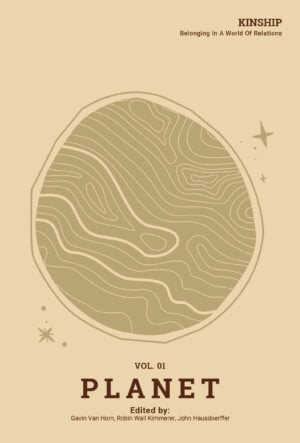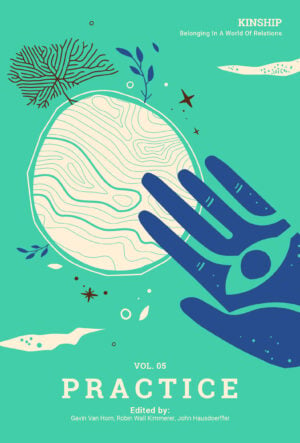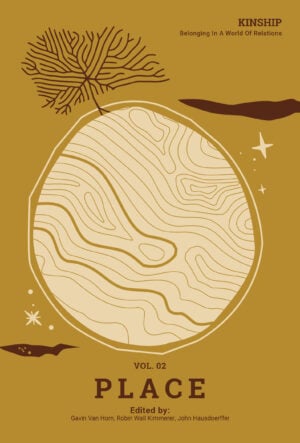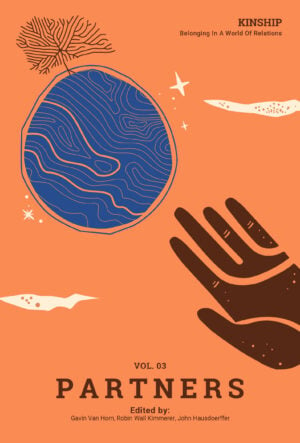Kinship: Belonging in a World of Relations, Vol. 3 – Partners
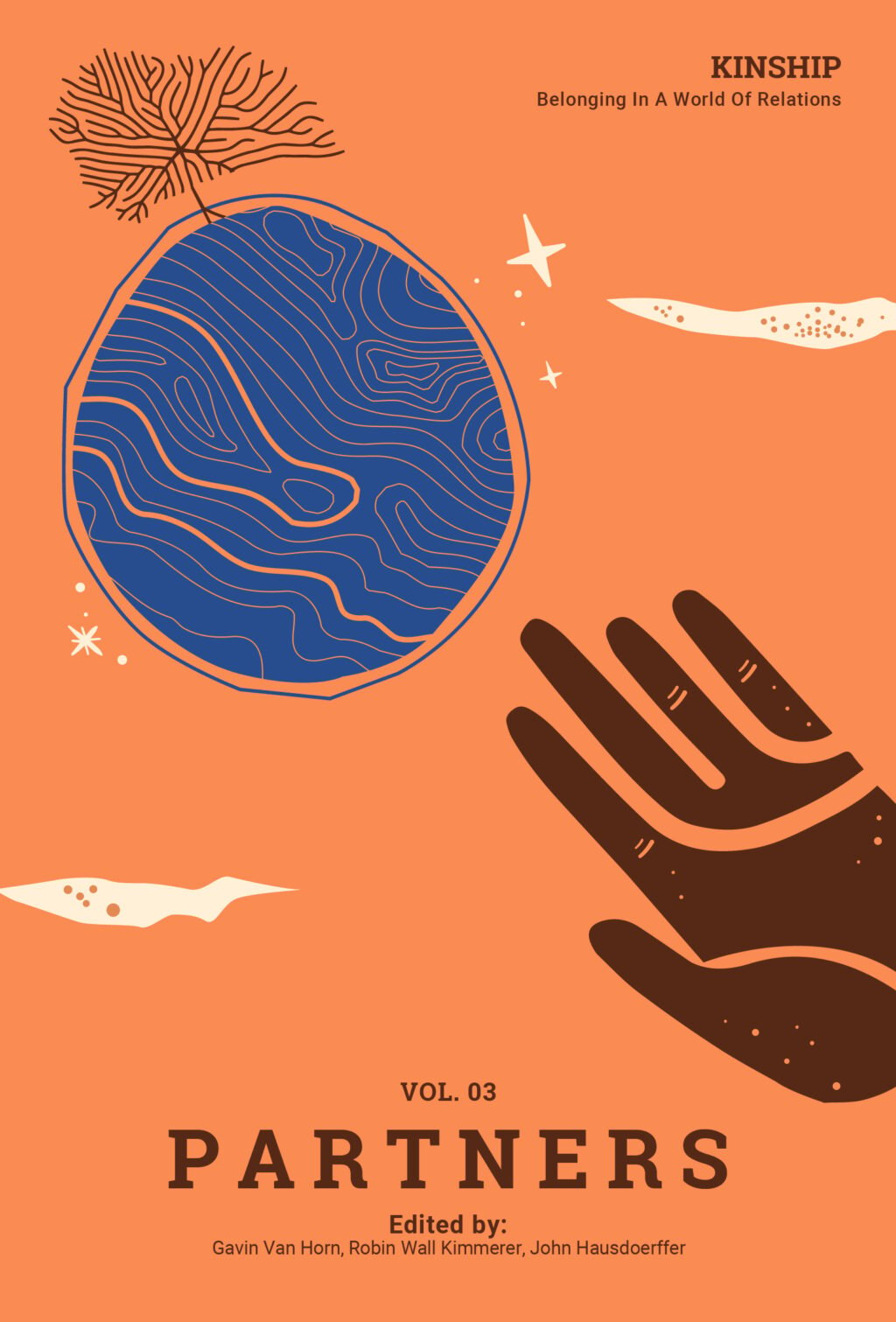
Kinship: Belonging in a World of Relations, Vol. 3 – Partners
*Part of the 5-Volume Set 2022 Nautilus Book Award Gold Medal Winner: Ecology & Environment and Special Honors as Best of Anthology
Volume 3 of the Kinship series revolves around the question of interspecies relations: How do relations between and among different species foster a sense of responsibility and belonging in us?
We live in an astounding world of relations. We share these ties that bind with our fellow humans—and we share these relations with nonhuman beings as well. From the bacterium swimming in your belly to the trees exhaling the breath you breathe, this community of life is our kin—and, for many cultures around the world, being human is based upon this extended sense of kinship.
Kinship: Belonging in a World of Relations is a lively series that explores our deep interconnections with the living world. The five Kinship volumes—Planet, Place, Partners, Persons, Practice—offer essays, interviews, poetry, and stories of solidarity, highlighting the interdependence that exists between humans and nonhuman beings. More than 70 contributors—including Robin Wall Kimmerer, Richard Powers, David Abram, J. Drew Lanham, and Sharon Blackie—invite readers into cosmologies, narratives, and everyday interactions that embrace a more-than-human world as worthy of our response and responsibility.
How do cultural traditions, narratives, and mythologies shape the ways we relate, or not, to other beings as kin? “Partners,” Volume 3 of the Kinship series, looks to the intimate relationships of respect and reverence we share with nonhuman species. The essayists and poets in this volume explore the stunning diversity of our relations to nonhuman persons—from biologist Merlin Sheldrake’s reflections on microscopic fungal networks, to writer Julian Hoffman’s moving stories about elephant emotions and communication, to Indigenous seed activist Rowen White’s deep care for plant relatives and ancestors. Our relationships to other creatures are not merely important; they make us possible. As poet Brenda Cárdenas, inspired by her cultural connections to the monarch butterfly, notes in this volume: “We are— / one life passing through the prism / of all others, gathering color and song.”
Proceeds from sales of Kinship benefit the nonprofit, non-partisan Center for Humans and Nature, which partners with some of the brightest minds to explore human responsibilities to each other and the more-than-human world. The Center brings together philosophers, ecologists, artists, political scientists, anthropologists, poets and economists, among others, to think creatively about a resilient future for the whole community of life.
Reviews and Praise
“This collection is a passionate call to turn towards the living Earth with reverence and respect, and in so doing to cultivate new and old forms of curiosity, of understanding, and of responsibility. Across five captivating volumes, Kinship: Belonging in a World of Relations brings together a rich diversity of voices and perspectives. Contributions range in form from poetry to interviews and essays, drawing on and engaging with the insights of Indigenous stories, philosophy, the natural sciences, and much more. Ultimately, this is a collection that does much more than simply describe the webs of relationship that are our world of kin. At the same time, it invites and at times pulls the reader into a sense of the fundamental sharedness of all life and our profound obligations, perhaps now more than ever, to hold open room for others to be and to become in their own unique and precious ways.”—Thom van Dooren, author of The Wake of Crows: Living and Dying in Shared Worlds
More Reviews and Praise
“Essential reading about the question of our time: how to belong. A chorus of beautiful, wise, grieving, exulting, and generative voices, guiding us into true ‘family values’ for a wild living Earth. These collections offer rare and rich insight into how to find, honor, and heal the bonds of blood, place, time, and ethics that knit us to all other beings.”—David George Haskell, author of The Forest Unseen and The Songs of Trees
"Sometimes when we are working with a document, when it’s growing and changing, we call it “live.” Likewise, this book is live. It’s full of life. It’s living inside you as you read it and you are living inside it. It’s changing you and you’re changing it. May this book be a living document that guides us toward love and care for all kin."—Janisse Ray, author of Wild Spectacle
"The Kinship series of books is an ensemble of outstanding essays that reveal the truth that reality is rooted in relationships. After reading these marvellous essays, it becomes crystal clear that there is no reality outside relationships. These books shatter the old story of separation between humans and Nature and explode the belief that nature is a machine and the planet Earth is a dead rock. Here is the new story of the living Earth and a celebration of deep connectivity of life; human as well as more-than-human life. These are inspiring and enlightening essays. They will change your perception of Nature. I recommend these books wholeheartedly!"—Satish Kumar, Founder, Schumacher College, Editor Emeritus, Resurgence & Ecologist
“What a joyful series this is, this family of books, crafted with love, clarity, and compassion by a family of poets, scholars, and sages. Together the volumes form a five-part harmony, converging beautifully around notions of kinship and kinning. The authors ask, how do we rightly relate? How may we learn to live well with our kin? Can we listen with sensitivity to the voices and languages of others, the beings with fur, claws, wings, scales, and fins with whom we share the mountains, rivers, seas, grasslands, and forests, places that ring with spirit and meaning, too, who are family, too? The chapters are stories as much as studies, narratives born from experience, wisdom, and observations over many generations. I can’t wait to share this family with my students and colleagues in conservation and anthropology, and with my friends and kin everywhere.”—Dr. Amanda Stronza, Anthropologist and Professor of Ecology and Conservation Biology, Texas A&M University
“Kinship is essential reading. Five books of elemental grace and charm, beginning with a spider's web. Each strand glistens in the sunlight, dreaming, catch and release, a journey through the multiverse. Each gathering of words, a page, a tribe, a story of who we are, who we have been, and who we've yet to become, shiny, bright, new, and very old. The DNA of rock and stone, of all our relations, the chemistry of breathing, letting go, and Love. Again, again, and again.”—John Francis, PhD, author of Planetwalker: 17 Years of Silence, 22 Years of Walking
“At a time when divisive politics and human-first ideologies dominate public discourse, Kinship provides a deeply-moving, soul-rejuvenating, and course-correcting primer for recognizing and building relationships among all living things. Here readers will find solace in essays and poems about what we’re losing, as well as inspiration for how to live well with other humans—and with our other-than-human kin. But Kinship is more than instructive. Taken together, these exquisite volumes are a balm for the soul.”—Dr. Amy Brady, Executive Director of Orion magazine
"Kinship is the type of series I would want to gift to my wild, untamed, and unschooled children, for from its pages springs an education at the end of homogenous time, a crack in the tarmac of ascension, an insurgency of the hitherto invisible. At a time when the human is no longer tenable as a category unto itself, we will need the prophetic voices of these poets, philosophers, mothers, fathers, scientists, thinkers, public intellectuals, artists, and awestruck fugitives to kindle a politics of humility, to help us fall down to earth from our gilded perches, to help us stray from the threatening familiarity of our own image. It is time to meet the others we imagined we left behind: this constellation of stars will guide us."—Bayo Akomolafe, Ph.D., author of These Wilds Beyond our Fences: Letters to My Daughter on Humanity’s Search for Home
“The Kinship series upends colonial paradigms around humans and our relationship with more-than-human nature. These paradigms have driven mainstream environmental movements to engage in myopic efforts that at times have exacerbated ecological imbalances. Through stories, essays, art, poetry, and more, contributors chip away at the layers that bind our collective colonial ethos. Rather than owning nature, we are urged to think about our kinship with all that is nonhuman. Rather than controlling our environments using methods rooted in human exceptionalism (i.e., we know best), we are urged to learn from our kin. Rather than “using” land, water, and wildlife as “natural resources,” we are urged to be in reciprocity and right relationship with our kin. Rather than labeling birds, rocks, and rivers as “it,” we are urged to think of them as persons who have their own rights. Rather than being static, we are urged to be kinetic (Kin-etic?). Decolonization begins with unlearning, and this is a good place to begin.”—Aparna Rajagopal (she/her), founding partner of the Avarna Group and cofounder of PGM ONE Summit
"The wonderful essays gathered here will stir minds and open hearts with the reminder that kinship is about how all things are connected, and that these relationships are best when acknowledged, attended to, and above all, savored."—Florence Williams, author of The Nature Fix: How Being in Nature Makes us Happier, Healthier, and More Creative
Reviews and Praise
“This collection is a passionate call to turn towards the living Earth with reverence and respect, and in so doing to cultivate new and old forms of curiosity, of understanding, and of responsibility. Across five captivating volumes, Kinship: Belonging in a World of Relations brings together a rich diversity of voices and perspectives. Contributions range in form from poetry to interviews and essays, drawing on and engaging with the insights of Indigenous stories, philosophy, the natural sciences, and much more. Ultimately, this is a collection that does much more than simply describe the webs of relationship that are our world of kin. At the same time, it invites and at times pulls the reader into a sense of the fundamental sharedness of all life and our profound obligations, perhaps now more than ever, to hold open room for others to be and to become in their own unique and precious ways.”—Thom van Dooren, author of The Wake of Crows: Living and Dying in Shared Worlds
“Essential reading about the question of our time: how to belong. A chorus of beautiful, wise, grieving, exulting, and generative voices, guiding us into true ‘family values’ for a wild living Earth. These collections offer rare and rich insight into how to find, honor, and heal the bonds of blood, place, time, and ethics that knit us to all other beings.”—David George Haskell, author of The Forest Unseen and The Songs of Trees
"Sometimes when we are working with a document, when it’s growing and changing, we call it “live.” Likewise, this book is live. It’s full of life. It’s living inside you as you read it and you are living inside it. It’s changing you and you’re changing it. May this book be a living document that guides us toward love and care for all kin."—Janisse Ray, author of Wild Spectacle
"The Kinship series of books is an ensemble of outstanding essays that reveal the truth that reality is rooted in relationships. After reading these marvellous essays, it becomes crystal clear that there is no reality outside relationships. These books shatter the old story of separation between humans and Nature and explode the belief that nature is a machine and the planet Earth is a dead rock. Here is the new story of the living Earth and a celebration of deep connectivity of life; human as well as more-than-human life. These are inspiring and enlightening essays. They will change your perception of Nature. I recommend these books wholeheartedly!"—Satish Kumar, Founder, Schumacher College, Editor Emeritus, Resurgence & Ecologist
“What a joyful series this is, this family of books, crafted with love, clarity, and compassion by a family of poets, scholars, and sages. Together the volumes form a five-part harmony, converging beautifully around notions of kinship and kinning. The authors ask, how do we rightly relate? How may we learn to live well with our kin? Can we listen with sensitivity to the voices and languages of others, the beings with fur, claws, wings, scales, and fins with whom we share the mountains, rivers, seas, grasslands, and forests, places that ring with spirit and meaning, too, who are family, too? The chapters are stories as much as studies, narratives born from experience, wisdom, and observations over many generations. I can’t wait to share this family with my students and colleagues in conservation and anthropology, and with my friends and kin everywhere.”—Dr. Amanda Stronza, Anthropologist and Professor of Ecology and Conservation Biology, Texas A&M University
“Kinship is essential reading. Five books of elemental grace and charm, beginning with a spider's web. Each strand glistens in the sunlight, dreaming, catch and release, a journey through the multiverse. Each gathering of words, a page, a tribe, a story of who we are, who we have been, and who we've yet to become, shiny, bright, new, and very old. The DNA of rock and stone, of all our relations, the chemistry of breathing, letting go, and Love. Again, again, and again.”—John Francis, PhD, author of Planetwalker: 17 Years of Silence, 22 Years of Walking
“At a time when divisive politics and human-first ideologies dominate public discourse, Kinship provides a deeply-moving, soul-rejuvenating, and course-correcting primer for recognizing and building relationships among all living things. Here readers will find solace in essays and poems about what we’re losing, as well as inspiration for how to live well with other humans—and with our other-than-human kin. But Kinship is more than instructive. Taken together, these exquisite volumes are a balm for the soul.”—Dr. Amy Brady, Executive Director of Orion magazine
"Kinship is the type of series I would want to gift to my wild, untamed, and unschooled children, for from its pages springs an education at the end of homogenous time, a crack in the tarmac of ascension, an insurgency of the hitherto invisible. At a time when the human is no longer tenable as a category unto itself, we will need the prophetic voices of these poets, philosophers, mothers, fathers, scientists, thinkers, public intellectuals, artists, and awestruck fugitives to kindle a politics of humility, to help us fall down to earth from our gilded perches, to help us stray from the threatening familiarity of our own image. It is time to meet the others we imagined we left behind: this constellation of stars will guide us."—Bayo Akomolafe, Ph.D., author of These Wilds Beyond our Fences: Letters to My Daughter on Humanity’s Search for Home
“The Kinship series upends colonial paradigms around humans and our relationship with more-than-human nature. These paradigms have driven mainstream environmental movements to engage in myopic efforts that at times have exacerbated ecological imbalances. Through stories, essays, art, poetry, and more, contributors chip away at the layers that bind our collective colonial ethos. Rather than owning nature, we are urged to think about our kinship with all that is nonhuman. Rather than controlling our environments using methods rooted in human exceptionalism (i.e., we know best), we are urged to learn from our kin. Rather than “using” land, water, and wildlife as “natural resources,” we are urged to be in reciprocity and right relationship with our kin. Rather than labeling birds, rocks, and rivers as “it,” we are urged to think of them as persons who have their own rights. Rather than being static, we are urged to be kinetic (Kin-etic?). Decolonization begins with unlearning, and this is a good place to begin.”—Aparna Rajagopal (she/her), founding partner of the Avarna Group and cofounder of PGM ONE Summit
"The wonderful essays gathered here will stir minds and open hearts with the reminder that kinship is about how all things are connected, and that these relationships are best when acknowledged, attended to, and above all, savored."—Florence Williams, author of The Nature Fix: How Being in Nature Makes us Happier, Healthier, and More Creative


